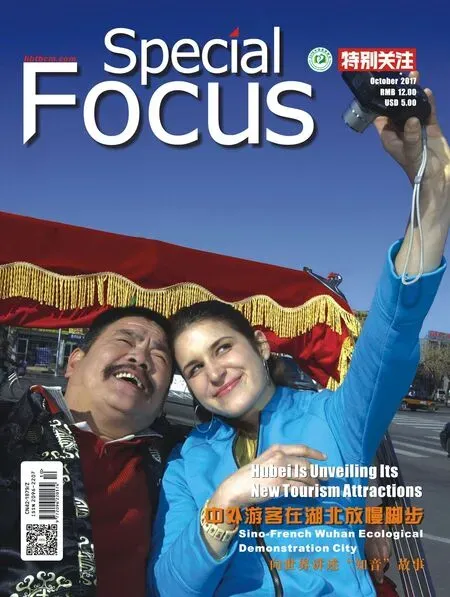Better an Empty Purse Than an Empty Head
By Yu Dan Translation: Zhu Yaguang
Better an Empty Purse Than an Empty Head
By Yu Dan Translation: Zhu Yaguang
In my childhood, I was fortunate enough to witness many joyous and graceful moments that had nothing to do with money. When I was about 12 or 13, the Cultural Revolution had just came to an end, and my dad went to work in Hefei. On one summer vacation, Mom took me to visit him.
At the dormitory where we stayed, there was a boxy concrete balcony on the outside, with just a square table in the middle, some big rattan chairs around it and nothing else. My dad and his friends, wearing loose T-shirts and waving palm fans, were lying on the chairs. Although their behaviors were exactly the same as other ordinary people, these men of letters had a unique way of enjoying a refined life.
When my dad and his friends attended their usual gathering, they always brought a white paper handheld fan. And then, one man began to recite a poem impromptu, and another person just wrote down the verses on the fan, and the third man drew a picture on the back of the fan,and there was the fourth man who just sat aside silently and focused on engraving a seal. When the calligraphy work was done, they would stamp the fan with the seal. Interestingly, they always took turns to change their role. The man who was capable of writing good poems would often draw, the man who drew the best would carve the seal, and the expert of seal carving would recite a poem. Gradually, they made lots of paper fans together. Later, when their group disbanded and went their separate ways, each of them got one of the fans.
Today, I still remember Uncle Lin, who taught me to recite in Shanghai dialect the verse “It breaks my heart to see blooming trees near the tower. The country torn apart, how could I admire the flower?” He told me, “Dan, you should never forget about the checked tone. Otherwise,you will find it difficult to sing Kun Opera, and neither can you compose classical Chinese poems. Although your dad is better educated than me, I do better recitation than him, because he is a northerner. So you should learn how to recite from your Uncle Lin.”
Even to this day, I still miss that balcony.The charm of that place and the atmosphere of the Chinese scholars are always on my mind.Although my dad and his friends have passed away, I still keep some of their poems in my home.
Uncle Zhang from Shanghai had three sons and no daughters, and he was very fond of me.Uncle Zhang had perfect handwriting, and he once wrote a five-character poem as a gift for my father, and the last two verses translated roughly like this, “You are perfectly enviable for having a lovely daughter in your home.”In Uncle Zhang’s opinion, having a daughter is just like owning the most valuable treasure of the world.
How time flies! Thirty years have gone by. All along the way,I have been brought up under the care, trust, guidance, and enlightenment of many people.In this sense, I am rich. Although I was once hard up for money,I never felt poor. As the saying goes, better an empty purse than an empty head. As long as you are passionate about life and dreams,you can always live a tasteful life.◆
我很庆幸在很小的时候就见过许多没钱的欢喜和典雅。我十二三岁的时候,“文革”刚刚结束,父亲去合肥工作。夏天放暑假,我和母亲去看望父亲。
我们住的宿舍外面有一个四四方方的水泥阳台,上面没有任何装饰,中间放着一张小方桌,四周摆着几把大藤椅。我父亲和他的朋友们,穿着老头衫,摇着大蒲扇,靠在藤椅里,表面上看起来寻常极了,但他们毕竟是文人,自有属于他们的雅致。
他们几个人经常拿一幅白扇面,第一个人吟一首诗,第二个人提笔把诗题在扇面上,第三个人在扇子的背面挥毫作画,而另外一个人则在一边静静地刻章。等到书画作好,再盖上闲章。他们经常反串,往往是最擅长作诗的去作画,最擅长作画的人去治印,治印最好的人去吟诗。就这样,他们合作做了一把又一把扇子。等到他们各奔东西时,每个人手里都拿着几个人合作的扇子。
一直到现在,我还记得林叔叔用上海口音的话教我吟诵:“花近高楼伤客心,万方多难此登临。”林叔叔告诉我:“小丹,要记住什么是入声字。不会入声字,你就唱不了昆曲;不会入声字,你就不会作古体诗。我学问没你爸爸好,但是我吟诵比他强,因为他是北方人。所以,吟诵要跟叔叔学。”
直到现在,我都特别怀念那个阳台。那个地方的情趣,中国文人的气息,一直都让我怀念。如今,那些叔叔和我的父亲均已作古,但我家一直还留着那些叔叔们写的诗。
上海的张叔叔有三个儿子,没有女儿,特别喜欢我。张叔叔的字写得很漂亮,他写了一首五律诗送给我父亲,结尾两句是“羡君真敌国,家富一千金”。在张叔叔看来,家里有个女儿,可谓富可敌国。
如今,一晃三十多年过去了。一路走来,我其实是在很多人的关爱、嘱托、提携、濡染下长大的。从这个意义上来讲,我很富有,从小就有很多特别奢侈的爱陪伴着长大。我有过没钱的时候,但没有觉得穷过。所以,没钱不可怕,可怕的是精神上的贫穷。只要心怀对生活的热爱和对梦想的追求,日子依然可以饶有情趣。◆
没钱有情致
文/于丹 译/朱亚光


(摘自《此心光明万物生》长江文艺出版社)
(From A Bright Heart Nurtures Everything, Changjiang Literature& Art Press)

